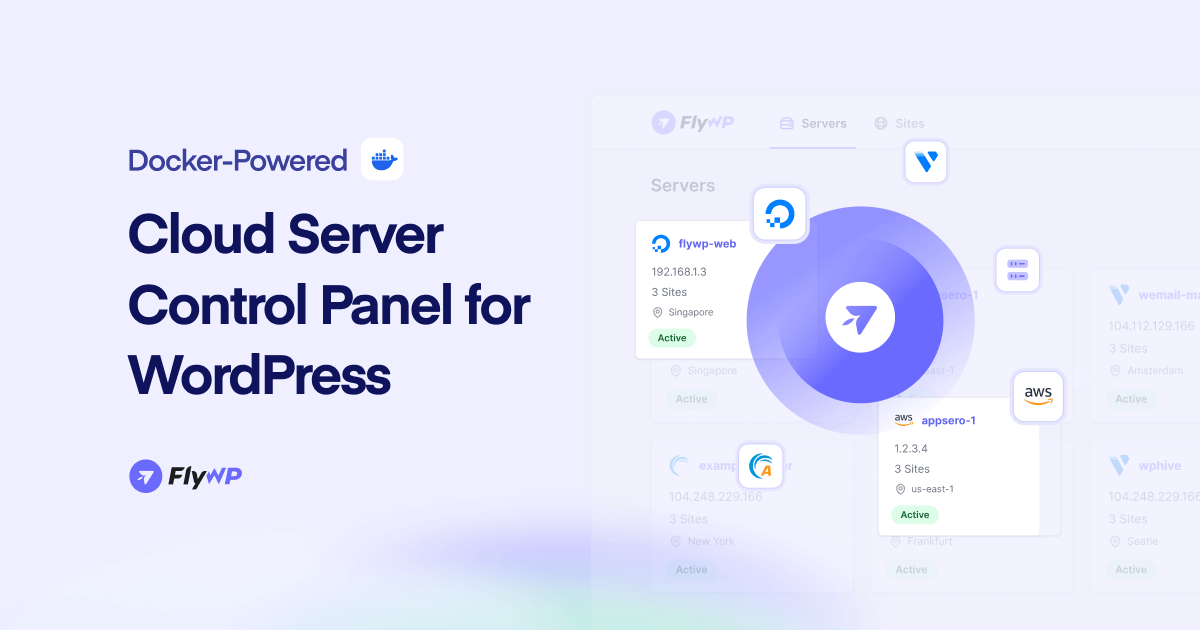If you’re looking for the best Ploi alternatives to deploy and manage your servers in 2025, you’re not alone. While Ploi is a fantastic server management panel, your specific project might call for a different set of features, a lower price point, or support for a wider range of technologies like Node.js, Python, or Ruby.
Choosing the right server control panel is crucial for a smooth and scalable workflow. To make your decision easier, we’ve done the research and compiled a definitive list of the top alternatives to Ploi. Whether you’re a freelancer, a growing agency, or a SaaS business, this article will guide you to the perfect platform for your deployment needs.
Let’s get started.
First, What is Ploi?
Before exploring alternatives, let’s quickly define our baseline. Ploi.io is a popular server management panel that automates the entire process of provisioning servers and deploying web applications. It’s designed for developers who want to avoid manual server configuration and focus purely on their code.
Essentially, you connect Ploi to a cloud provider like DigitalOcean or AWS, and it sets up a production-ready server with an optimized stack (NGINX, PHP, etc.). You then link your Git repository and can deploy your site with a few clicks.
Its core strengths include:
- Rapid Server Provisioning: Sets up new servers in minutes.
- 1-Click Installers: Easily deploys popular apps like Laravel, WordPress, and Statamic.
- Developer-Focused Tools: Includes free SSL, easy queue management, and automated backups.
- Advanced Features: Offers zero-downtime deployments, load balancing, and team management on higher-tier SaaS plans.
In short, Ploi provides a powerful, user-friendly control panel for your servers, setting a high standard for modern deployment tools.
Now, let’s discuss the top 5 alternatives..
1. FlyWP- Considering WordPress? FlyWP is the Specialized Alternative You Need

If your daily work revolves exclusively around building, managing, and securing WordPress sites, then FlyWP isn’t just an alternative to Ploi; it’s a specialist tool crafted for your exact needs. While Ploi is an excellent general-purpose panel for the PHP world, FlyWP trades that broad versatility for a deep, powerful feature set laser-focused on the WordPress ecosystem.
It operates on the same principle as Ploi—connecting to your own cloud servers (DO, AWS, Vultr, Hetzner, etc.) to automate management—but every feature is designed to make the life of a WordPress developer or agency easier.
Effortless WordPress & Server Management
FlyWP excels at centralizing control and automating tedious tasks. Beyond standard server provisioning, its management tools are a dream for anyone handling multiple WordPress sites.
- Centralized WordPress Updates: This is a standout feature. Manage and apply bulk updates for WordPress core, themes, and plugins across all your sites from a single dashboard.
- Complete Site Control: Effortlessly handle migrations with one-click cloning and transfers. Manage domains, create instant demo sites for testing, and access files directly with a web-based File Manager.
- Advanced Automation: Use the Cron Job Manager for simple tasks or the powerful Ofelia Job Scheduler for more complex, automated site functions. You can also manage background processes easily with Supervisor Daemons.
A Fortress for Your WordPress Sites
Security is a cornerstone of the FlyWP platform, with multiple layers of protection designed to thwart common WordPress vulnerabilities.
- Robust, Multi-Layered Firewall: Implements a server-level firewall and the powerful 7G Firewall to block common attacks, malicious traffic, and bad bots.
- Proactive Security Measures: Get automatic security updates during scheduled maintenance windows, protect against brute-force attacks with user interaction controls, and secure your account with Two-Factor Authentication (2FA).
- WordPress-Specific Hardening: Disable unnecessary features like XML-RPC through content and protocol filtering to reduce the attack surface of your sites.
Built for Speed and Modern Architecture
FlyWP leverages a modern, containerized architecture to ensure both performance and security.
- Docker-Based Site Isolation: Each site runs in its own secure, isolated Docker container. This is a massive security win, as it prevents a potential breach on one site from affecting others on the same server.
- Optimized Site Stacks: Choose between high-performance Nginx or OpenLiteSpeed stacks on a per-site basis to get the best performance for your project.
- Advanced Caching Built-In: Boost site speed right out of the box with integrated Redis and FastCGI page caching.
Powerful Tools for Developers & Agencies
FlyWP isn’t just for simple sites; it provides the deep control that developers and power users demand.
- Git-Based Deployment: Just like Ploi, you can connect your Git repository and automatically deploy changes on every push.
- Direct Config Management: Get direct access to manage crucial files and settings through the Nginx Config Editor and the WP Config Manager, saving you from ever needing to SSH for minor tweaks.
- Full Server Control: Manage PHP versions per site, handle DNS with Cloudflare integration, access a powerful Server CLI, and manage databases directly with an Advanced Database Manager or phpMyAdmin.
The Verdict
Why Choose FlyWP? Choose FlyWP if you are a WordPress developer, freelancer, or agency. Its workflow is simply unmatched for managing a portfolio of WordPress sites. The time saved on updates, security hardening, and performance tuning makes it an incredibly efficient and powerful command center.
The Trade-Off: The only significant “con” is its specialization. If you need to deploy a Laravel application or any other non-WordPress project, you will need a different tool. But if you live and breathe WordPress, FlyWP is arguably one of the best-in-class alternatives to Ploi in 2025.
2. RunCloud

RunCloud is arguably Ploi’s most direct competitor, often appealing to developers who want a bit more granular control and a slightly different set of features while achieving the same goal: automating server management. It’s a robust, feature-rich platform known for excellent performance and flexibility.
Deeper Dive: Key Features & Comparison
RunCloud’s philosophy is about providing power and choice. While Ploi is celebrated for its clean and simple user experience, RunCloud’s dashboard exposes more configuration options directly. This powerful granularity might feel more complex for newcomers but is a major advantage for power users.
- Hybrid Web Server Stack: A key differentiator is the ability to run a native NGINX stack for pure performance or a hybrid NGINX + Apache stack. This provides invaluable flexibility for those working with applications that still rely on
.htaccessfiles. - Atomic Git Deployment: Similar to Ploi’s zero-downtime deployment, RunCloud uses an atomic deployment process. This ensures your site is never in a broken or semi-deployed state during an update by fully preparing the new version before switching it live.
- RunCloud Hub: For agencies and teams, RunCloud Hub provides a centralized dashboard to manage projects, billing, and team members across multiple server providers, simplifying client work.
- Built-in Backup & Monitoring: The platform includes its own robust, configurable backup system and detailed server health monitoring, providing insights into CPU, RAM, and disk usage.
Ultimately, RunCloud stands out as the choice for the developer or agency that craves more direct control over their server environment. Its feature-rich and performance-oriented platform is perfect for those who need flexibility like .htaccess support and don’t mind a slightly steeper learning curve to unlock its full potential.
3. SpinupWP

Entering the same specialized arena as FlyWP, SpinupWP is another top-tier server management panel built exclusively for WordPress. Backed by the team at WP Engine (formerly Delicious Brains), it carries a reputation for quality, stability, and adherence to WordPress best practices. It’s designed to turn any cloud server into a professional-grade WordPress host.
Deeper Dive: Key Features & Comparison
SpinupWP focuses on providing a “best practices” configuration out of the box. It’s less about endless options and more about giving you a perfectly tuned, secure environment specifically for WordPress.
- Highly Optimized Caching: Performance is a core feature. SpinupWP automatically configures multiple layers of caching, including Redis object caching and full-page caching, designed to make WordPress sites exceptionally fast.
- Developer-Friendly Workflow: It includes Git-based deployment, a
wp-clicommand interface directly in the dashboard, and easy cloning for creating staging sites, catering to a professional development process. - Security by Default: The platform provisions servers with a strong security baseline, including file permission management, firewall rules, and automated security updates, all tailored to protect WordPress.
- Clean, Focused UI: The dashboard is exceptionally clean and intuitive. This focus on just the essentials for WordPress makes it very approachable, though it means you won’t find tools for managing other types of applications.
SpinupWP is an ideal solution for the WordPress professional—be it a freelancer or an agency—who prioritizes performance, security, and a polished user experience. It allows you to offer clients top-tier WordPress hosting on your own servers without becoming a full-time sysadmin.
4. Cloudways

Cloudways represents a fundamental shift in approach. It is not just a server panel; it’s a fully managed cloud hosting platform. This distinction is crucial. With Ploi, you buy a server from DigitalOcean and pay Ploi to manage it. With Cloudways, you pay them one price, and they provide both the server (from your choice of provider) and the management platform in a single package, backed by 24/7 support.
Deeper Dive: Key Features & Comparison
The core value of Cloudways is convenience and peace of mind. It abstracts away even more of the DevOps process than Ploi does.
- All-in-One Platform: You choose a cloud provider (DigitalOcean, Vultr, AWS, etc.) within the Cloudways dashboard, and they handle provisioning, optimization, and billing. This eliminates the need to manage a separate account with the server provider.
- 24/7 Expert Support: This is a key feature. If your server has an issue at 3 AM, you can contact their support team to help resolve it, a level of service you don’t get with a pure server panel where you are ultimately responsible for the server’s health.
- Vertical Scaling: Need more power? You can resize your server’s RAM and CPU with a few clicks and minimal downtime. This simplicity is a major benefit, though it comes at the cost of the granular control and root access you’d have with Ploi.
- “ThunderStack” Performance: Cloudways has its own optimized server recipe (Apache, Nginx, Varnish, Redis) designed to deliver excellent performance for PHP applications right out of the box.
This platform is built for the small business owner, agency, or freelancer who wants the power of a VPS without any of the management headaches. If your priority is a fast, scalable website with a support team on standby, and you don’t need deep server-level access, Cloudways is a compelling option.
5. ServerPilot

ServerPilot is one of the original players in this space and has earned a reputation for being incredibly stable, secure, and straightforward. It’s a no-frills, rock-solid platform for managing standard PHP and WordPress sites on your own servers.
Deeper Dive: Key Features & Comparison
ServerPilot’s philosophy is “less is more.” It doesn’t try to compete with the sprawling feature sets of Ploi or RunCloud. Instead, it focuses on doing a few things exceptionally well: provisioning a secure server and running PHP applications on it reliably.
- Simplicity and Stability: The dashboard is clean and extremely easy to navigate. It’s a “set it and forget it” tool. Its stability is a key reason for its longevity and dedicated user base.
- Security First: ServerPilot has a strong security-first approach. It runs each site under a unique system user for isolation and maintains a fast, secure, and updated software stack on your behalf.
- Zero-Config Approach: It is designed to work perfectly out of the box with minimal configuration, making it very fast to get a new site live. This simplicity means it lacks some of the advanced deployment features found in more modern competitors.
ServerPilot is for the user who values stability and security above all else. If you don’t need complex Git-based deployment workflows or a vast array of one-click installers, and you just want a simple, secure, and reliable way to run your PHP sites, ServerPilot remains a fantastic and trusted choice.
What to Look for While Choosing a Server Management Tool?
| Factor | Key Questions to Ask | Why It Matters |
| Technology Stack & Core Needs | – Does it support my primary application (e.g., Laravel, WordPress, custom PHP) – Is it compatible with my preferred cloud server providers (AWS, DigitalOcean, etc.)? – Does it easily manage my required databases (MySQL, PostgreSQL) and caches (Redis)? | The tool must fundamentally support your technical requirements. A mismatch here makes a tool unusable for your projects. |
| User Experience & Workflow | – Is the dashboard clean, intuitive, and easy to navigate? – How much does it automate? (Cron jobs, queue workers, deployments). – Can I deploy my sites easily from a Git repository (e.g., GitHub)? | A good user experience saves significant time, reduces errors, and makes managing your servers a pleasant task rather than a chore. |
| Security Features | – Does it provide free, auto-renewing Let’s Encrypt SSL certificates? – Does it offer a simple interface for managing the server firewall? – How does it handle site isolation to prevent breaches from spreading? | A strong security posture is non-negotiable. The panel should make it easy to implement security best practices without being a security expert. |
| Scalability & Team Features | – Can I add team members with different permission levels? – Does the tool support load balancing for high-traffic applications? – What kind of server monitoring and alerting is built-in? | Your needs will grow. A good tool should support your application’s growth and allow for effective team collaboration as your business expands. |
| Pricing & Support Model | -Is it a flat SaaS fee (you bring the server) or a bundled managed service? -What is the total cost of ownership (panel fee + server costs)? -What level of support is included (community, email, 24/7 live chat)? | Understanding the full cost and the support safety net you’re getting is crucial for budgeting and for peace of mind when issues inevitably arise. |
Okay, So What’s the ‘Ploi’ Twist?
The plot twist is simple: the perfect server management tool isn’t a single name, but a reflection of your own needs. We’ve explored a fantastic cast of characters in the 2025 DevOps story. From the direct, feature-rich rival RunCloud to the WordPress-obsessed specialists FlyWP and SpinupWP, the choice is vast. We’ve seen the “done-for-you” convenience of Cloudways and the rock-solid stability of a veteran like ServerPilot.
